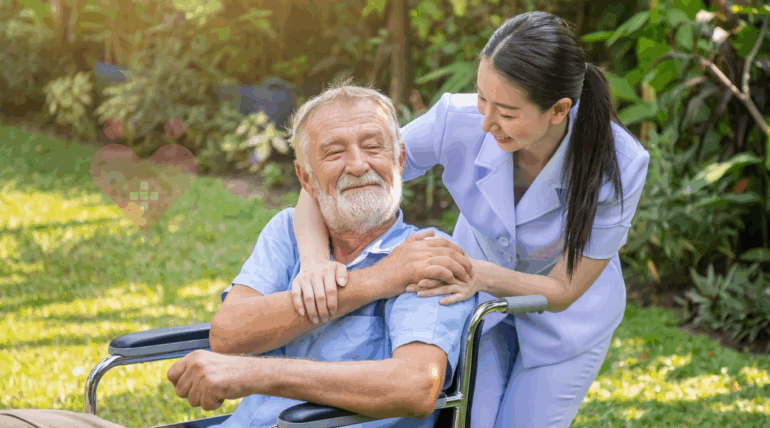
Not all care is the same, and certainly, the needs of the elderly differ from those of younger people.
As age increases, the demands become even more focused, requiring a lot more than an overall form of caregiving can provide.
Caregivers are trained to safely manage chronic health conditions, prevent accidents, and provide individualized emotional support.
Managing Complex Health Needs
Elderly patients often have several chronic diseases, such as diabetes, heart disease, and dementia conditions that have to be critically monitored and controlled at all times. The complexity of these illnesses demands more than basic care—this is where specially trained caregivers excel. They are equipped with the knowledge to administer medications accurately, monitor symptoms, and act swiftly to prevent complications.
For instance, for a patient diagnosed with dementia, carers monitor the timing of prescribed drugs side by side with monitoring for behavioral changes that may require adjustments in treatment. For patients who suffer from heart disease and diabetes, they monitor other vital signs like the patient’s blood pressure and blood sugar levels, where any anomalies are corrected early.
Working with Health Care Providers
These caregivers never work in a vacuum. They consult medical professionals, who advise them on critical eye openings that may not be promptly seen during routine check-ups. Thus, the system ensures that health is holistically managed and complications are brought at bay to improve the elderly’s quality of life.
Ensuring Mobility and Safety
Elderly people most often experience a loss in mobility, which complicates any of their daily activities and increases the risk of falls. The fear of falling can be overwhelming, as one fall may cause serious injuries or long-term setbacks in health. Specially trained caregivers play an important role in reducing such risks. They are highly skilled in movement assisting, helping a person stand up, walk, or sit down safely.
Safe Environment for Livelihood
Apart from offering physical support, caregivers also make the home environment safe. They tend to check out potential dangers, such as a loose rug or clutter, and make necessary adjustments. Some simple yet indispensable alterations include putting grip bars in the bathroom or changing furniture so that one can easily navigate through the spaces.
Promoting Active Independence
Physical support translates to a higher self-esteem level and enables elderly citizens to be mobile. This combination of safety and mobility enhances independence, which is fundamental for mental comfort. Caregivers tend to combine physical help with emotional reassurance so that as many older people can move and be independent as possible.
Providing Personalized Care
There is no one-size-fits-all approach to geriatric care. Every elder has a different combination of physical, emotional, and psychological needs.
Trained caregivers assist and provide personalized care according to an individual’s requirements. They adapt their management of various activities according to the situation, including bathing and dressing, providing psychological support, or managing complicated conditions such as dementia.
Adapting Care for Routine Activities
For some elderly, proper daily care should focus on physical support, such as mobility assistance or hygiene support. Others’ focus would be on emotional well-being. Skilled caregivers know that sometimes an elderly person needs far more than just a helping hand- they are able to notice when someone is ready to talk meaningfully, listen, or just be a calming presence.
Mental Struggles
When the shadow of cognitive decline comes into play, then personalized care becomes much more in demand.
Caregivers who have experience in dealing with Alzheimer’s and Dementia know how to introduce a structured daily routine that can stimulate cognitive functionalities and handle whatever behavioral issues may come up during the process.
This flexibility will allow them to deliver care that fosters both the physical and mental and emotional development of elders resulting in supportive living environment characterized with safety and worth.
Effective Communication
Communication with older adults is rarely straightforward. Age may bring some difficulties, like hearing loss or impairments due to dementia, that make recognizing and expressing one’s needs difficult.
In such situations, respectful, clear communication is important. Those carers trained in this way are sensitive to nuances in all of these ways. They can speak patiently; the words chosen are simply for letting the message pass, and they take a moment to recognize that it is understood.
Engaging Respectfully Despite the Limits
Also, providers know that communication is more than just words. Sometimes, it is a body language or tone of voice. It may be the presence in the moment. They learn to recognize these non-verbal communications—whether a gesture or an expression and then respond in a manner that makes the elderly feel heard, even when they cannot find words.
Reducing Confusion and Frustration
For the elderly who experience cognitive decline, confusion and frustration can accelerate when communication goes awry. Since well-trained caregivers can diffuse situations with calmness, repetition without patronizing, and rewording into more accessible ways of thought, they ensure the older adults are heard and valued – thereby decreasing frustration and isolation.
Dementia and Cognitive Decline Care
Caring for a patient with dementia or Alzheimer’s is far more than simple caregiving. Dementia presents many behavioral and cognitive challenges that require education, patience, and skill. Trained caregivers in dementia care understand the nature of cognitive decline.
Moments of confusion or agitation might seem to arise unexpectedly, or a familiar place may become confusing for an individual. This professional is able to respond in such situations with calmness and effectiveness, thereby ensuring the safety and emotional stability of the person under their care.
Controlling Behavioral Problems
Cognitive decline most often coincides with behavioral problems that are hard to tackle without proper training. In these cases, from aggression and anxiety to wandering or confusion, practicing caregivers in dementia care become accustomed to such patterns and act accordingly.
Cognitive Stimulation within the Scope of Care
Caregivers introduce activities specifically designed to spark brain activity—whether memory games, simple puzzles, or conversations with people that stir the individual. These small but meaningful moments sustain cognitive function, and those occasional moments of clarity are highly cherished by seniors and their families.
Offering Emotional Support and Companionship
Trained caregivers know that emotional support is not just about being there; it is an actual relationship built through conversations, actions, or just sitting with another person in a quiet companionship.
The most comforting thing to the elderly is when carers console them and provide them with an emotional connection. This improves the mental health of most elders, flushing out feelings of isolation and allowing them to feel generally better.
Pillar of Stability
For the elderly, especially those with cognitive decline or limited mobility, their world can feel uncertain or disconnected. A caregiver, through consistent care and companionship, becomes a pillar of stability—someone they can rely on day after day.
Family Support and Education
In most cases, caregivers become educators and supporters, not only to the elderly but also to their families. When a loved one’s health begins to decline, families begin to feel overwhelmed and do not know what to do with new challenges. Caregivers, with their specialized training, take up the task and educate the family regarding the loved one’s condition, giving insights and practical directions on how to care at home.
Relief Through Respite Care
Caregivers are also cognizant of how the continuous care for a loved one might influence a family member. Long-term caregiving leads to not only physical draining but also emotional stress and burnout. Caregivers provide respite care, which provides relief to the family member for a much-needed time off, while their loved one is still well cared for.
Conclusion
For older people, a good quality of life is not just about health but is more related to how safe and valued they feel. A specially trained caregiver understands this fact and brings a more holistic approach to elder care. They cope with complicated medical needs as well as psychological well-being. The professional knowledge translates daily problems into workable routines that allow seniors to lead respectable lives with independence and ties.






